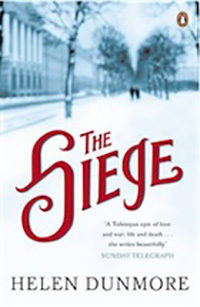Words, dropping on her like millstones
 The Siege
The Siege
by Helen Dunmore
After thoroughly enjoying Helen Dunmore’s A Spell of Winter for my old book club, I added a random handful of her other books to my Christmas wishlist and this was the one my Mum picked out. I’m sure they would all have worked out equally well, as I’m starting to think I might be a Dunmore fan.
This is the story of the 1941 siege of Leningrad. Which sounds like a tough, war-heavy subject, and this book is certainly all about how tough it was, but Dunmore also makes it compulsively readable. 23-year-old Anna, her father Mikhail and her 5-year-old brother Kolya are settling into summer life at their dacha, in the countryside just outside Leningrad, when news of the German army’s advance reaches them. Instead of spending the brief northern summer growing their usual store of food for winter, they must instead hurry back to the city and help to build defences before the Germans arrive.
“Even the trees in the parks have become something else. Now they are defensive positions, behind which a man can crouch, watching, alert, his cheek pressed against bark which is carved with lovers’ initials. Each prospect of stone and water yields a second meaning which seems to have been waiting, hidden, since the city was first conceived.”
Anna was already balancing a job she dislikes at the nursery with acting as mother to Kolya, and convincing their neighbours that they are trustworthy despite her father’s status as an intellectual who can no longer get his books published and the fact that they are not Party members, but now she must add volunteering for the war effort and the daily struggle to find enough food to keep them all alive.
As winter sets in all too soon, their family grows to include Andrei, a doctor who briefly served as a soldier alongside Mikhail, and Marina, a banned actress who has been a family friend as long as Anna can remember. Their world shrinks as every step outside becomes a battle against cold and fatigue, and the love growing between Anna and Andrei will just have to wait.
Early on in the novel, there are a few sections that are supposedly Mikhail’s diary, and I must admit I felt a little tripped up by them, and I wasn’t quite convinced that they worked. There are other sudden switches of perspective too that threw me, or at least broke up the flow, but perhaps that’s a good thing, giving a slightly wider perspective.
“Model charters, edicts, labour-days, allotted tasks, ‘liquidate the kulaks as a class’. I didn’t make up those words. So why did I feel guilty? Perhaps because I’m an educated man. One of those who ought to have given her bread, but instead all she has is words, dropping on her like millstones. We were going to make everything different, and better…Well, we certainly made things different.”
I could feel the cold and the hunger viscerally, and for a week I felt guilty about having warmth and food freely available to me. Dunmore makes the cold and hunger beautiful but also terrifying, a real danger that is bound to carry away some if not all of the characters before the end of the novel.
Anna is an interesting heroine. She is self-sacrificing, but only because there is no real choice. She offers to help when she can and the favour is sometimes returned. She recognises early on that she cannot have a life of her own as long as the siege lasts, and the novel is almost a document of her disappearance, her fading from view, because when we are reduced to an endless fight for survival, how much of our individuality can we retain?
By concentrating on Anna, we get a different-from-usual perspective of war and perhaps it’s this that I liked most of all. There is fighting happening somewhere over there, and at times bombs are a threat, but it is the siege itself that is the story, trapping people in a city with limited fuel, limited food and officials who must find a mathematical solution to the impossible problem of keeping three and a half million people alive.
“Late in the morning a lilac-coloured dawn will come, with burning frost that glitters on branches, on spills of frozen water, on snow, cupolas and boarded-up statues. Nothing has ever been more beautiful than these broad avenues, the snow-covered Neva, the parks and embankments. Only the people mar its perfection as they crawl out of their homes into the radiance of snow. Perhaps today is the day when they’ll fail to reach the bread queue. So they move on, flies caught between sheets of glass.”
The copy I have of this novel is covered with mentions of the sequel, The Betrayal, which I fear may have marred my enjoyment a little, as I know there is more to the story. Without knowing that, I think I would have found this a satisfying ending. But clearly Dunmore didn’t and the sequel’s title does sound promising!
Published 2001 by Viking.
Source: Christmas present from my Mum.